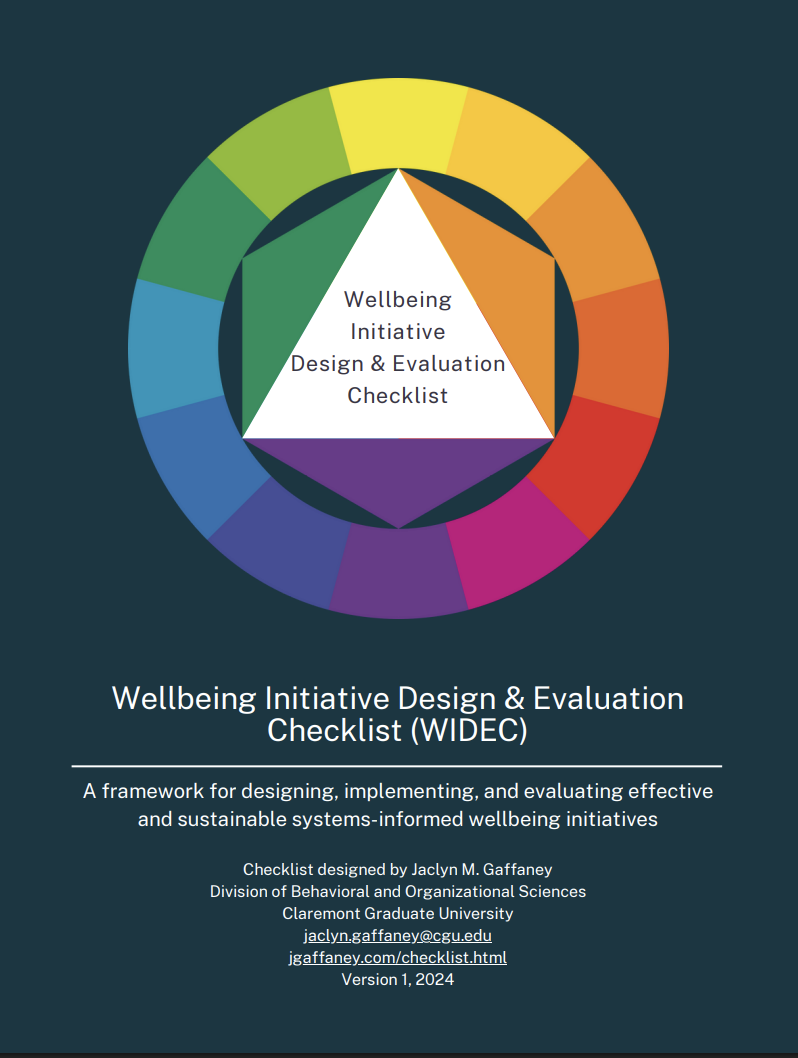Gaffaney Applied Research & Evaluation Consulting
My name is Jaclyn Gaffaney, though you can call me Jackie. I am a PhD trained evaluator, researcher, practitioner, and professor.
I have subject matter expertise in wellbeing science, positive psychology, organizational psychology, applied research, and evaluation. I find joy in bringing evidence-based practices into the world and in bridging the research-practice gap. I am currently based in Seattle.
Current Roles
Founder and Principal Consultant of Gaffaney Applied Research & Evaluation Consulting
Postdoctoral Researcher at Royal College of Surgeons in Ireland
Research & Evaluation Fellow at Claremont Graduate University

Services Offered
-

Evaluation Services
Want to know if you're having impact? Want to know how to improve your work?
I help clients measure effectiveness (outcome evaluation), assess quality (process evaluation), and clarify goals (theories of change, logic models). I design new tools, add scientific rigor to existing ones, build evaluation capacity, and turn data into action—so clients can better understand their work and amplify impact. -

Academic & Applied Research
Want the credibility of academic-level research and publishing? Want help developing a validated scale?
I conduct research for both applied and academic purposes. I publish academic journal articles and share insights at conferences to contribute to the fields of psychology and evaluation. I am an expert at scale development and validation. I collaborate with other researchers as well as non-academic practitioners that may be interested in co-publishing or co-presenting.
-

Program Design & Trainings
Want help designing or improving your program? Want help with a training or workshop?
I design, implement, and manage programs, initiatives, and interventions. I also conduct workshops and trainings. I have evaluated or developed leadership trainings, interventions, employee wellbeing initiatives, adolescent development programs, and social programs, amongst others, across educational institutions, organizations, nonprofits, and communities.
Research and Evaluation Skills
I offer an array of research and evaluation skills across both quantitative and qualitative methods. I tailor all of my work to the project's needs and context. I believe that the chosen methods should be the ones that most appropriately answers the research or evaluation questions. Therefore, I upskill and/or collaborate with others if a project calls for it. I tend to favor a mixed methods approach to triangulate across methods and/or build from one method to the next. My skills and specialties include:
-
Mixed methods (quantitative and qualitative), longitudinal, experimental, quasi-experimental, survey & scale development, needs assessment, social network analysis, appreciative inquiry, systematic review, checklist, behaviorally anchored rating scale, focus groups, interviews, observations, document review, archival data, etc.
-
Report creation, hosting data shares or data walks across stakeholders, using design thinking to brainstorm how to translate findings into actionable next steps.
-
Regression, ANOVA, factor analysis, growth curve modeling, multilevel modeling, structural equation modeling, path analysis, thematic analysis, etc.
-
The main difference is that research findings are meant to be generalizable and evaluation findings are meant to inform decisions about a specific program (or initiative, intervention, etc.).
Research is conducted to explore research questions or hypotheses about a topic, the answers of which are meant to be generalizable, transcend the sample(s), and contribute to science for other researchers to continue to build upon.
On the other hand, evaluations are conducted to explore evaluation questions or hypotheses about a specific program, the answers of which are meant to inform decisions about the specific initiative and are not necessarily generalizable beyond that initiative.
Core Principles
I approach all four areas of my work (evaluator, researcher, practitioner, and professor) with the following principles and values in mind:
Bridging the Research-Practice Gap: As someone at the intersection of academia and real-world application, I strive to bridge the research-practice gap, bringing learnings from research to practice and insights from practice to research.
Systems-Informed and Sustainable: I approach my work by being mindful of the complex social systems and systemic factors that can be impacted by, and can inform the work I'm doing. I strive to make systemic changes to optimize relevance and sustainability. I look for the leverage points that can make the most impact (leverage points are the places within a complex system where a small shift in one thing can produce big changes in everything).
Contextually and Culturally Responsive: I account for and tailor my work to the context, culture, and individuals. I strive to understand and respect cultural differences and to consider and respond appropriately to these differences.
Access and Inclusion: I strive to give equitable access along the continuum of human ability and experience wherever appropriate. I strive for inclusion in decision-making and participation.
Wellbeing and Strengths-Based: I actively search for opportunities and am prevention-oriented. I leverage the strengths of people and places. I use my expertise in wellbeing science and positive psychology throughout my work. I call upon my own VIA and Gallup strengths (including creativity, critical thinking, perspective, curiosity, love of learning, leadership, individualization, input, and achiever).
Evidence-Informed and Experimental: As a social scientist, I approach all endeavors with curiosity and an experimental lens. I use my expertise in research and evaluation to find existing evidence and to conduct new studies to contribute evidence.
Introducing the Wellbeing Initiative Design & Evaluation Checklist
I have created a practical, evidence-informed Checklist to help provide structure and guide people through the complex process of designing, implementing, and evaluating, systems-informed wellbeing initiatives.
Additional Background & References
Education
PhD in positive organizational psychology with a co-concentration in research methods & evaluation from Claremont Graduate University.
Master's in applied positive psychology (MAPP) from the University of Pennsylvania.
Bachelor’s in communication with a minor in communication design from the University of Southern California.
Publications & Previous Work
Google Scholar for a list of publications.
LinkedIn to see examples of previous work across applied and academic spaces.
Let’s Connect
Interested in working together for an evaluation, research, or other practitioner services?




